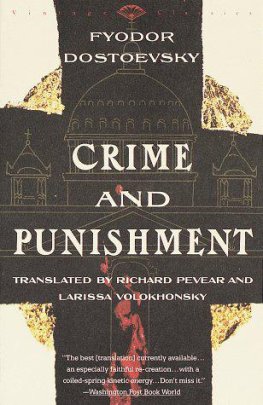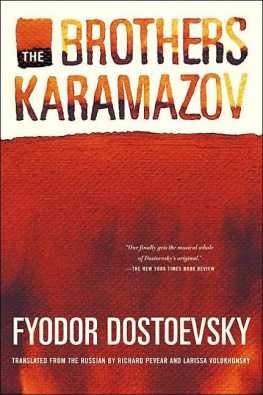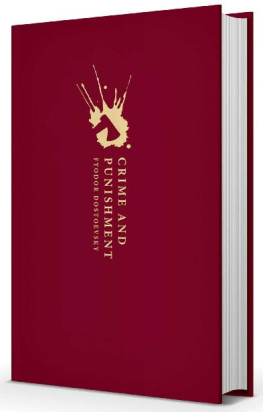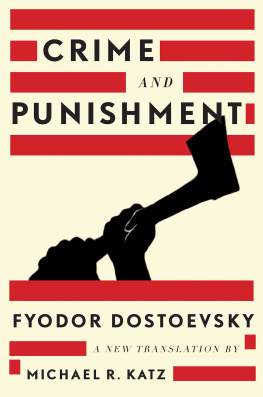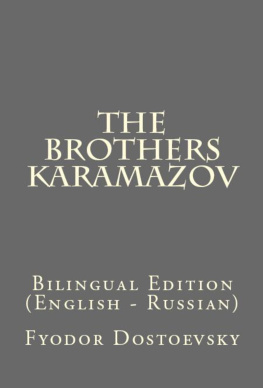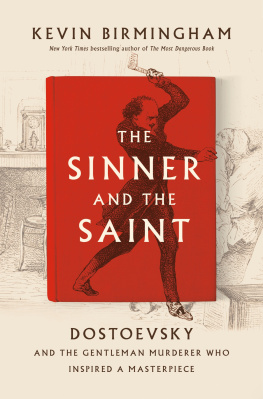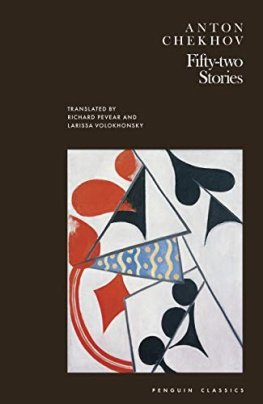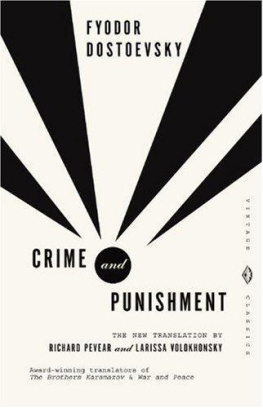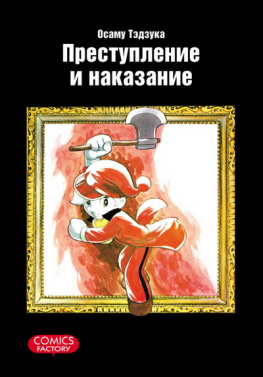FYODOR DOSTOEVSKY
CRIME AND PUNISHMENT
I want to do an unprecedented and eccentric thing, to write thirty printed sheets [480 printed pages] within the space of four months, forming two separate novels, of which I will write one in the morning and the other in the evening, and to finish them by a fixed deadline. Do you know, my dear Anna Vasilievna, that even now such eccentric and extraordinary things utterly delight me. I simply don't fit into the category of staid and conventional people . . . In this typically ebullient fashion, Dostoevsky described to a friend the predicament he found himself in during the summer of 1866. He was then forty-five, and had behind him ten years of imprisonment and exile for antigov-ernment activities, the death of his first wife and of his closest brother Mikhail, and debts amounting to some 43,000 roubles. A year earlier he had gone abroad to escape his creditors with 175 roubles in his pocket and an agreement with an unscrupulous bookseller, F. T. Stellovsky, to produce a new novel for him by November 1, 1866, failing which (and Stellovsky hoped he would fail) all his existing and future works would become the bookseller's property.
Fortunately, Dostoevsky managed to bring off this unprecedented...thing, though not quite in the way he envisaged. Work on one novel, which had been appearing serially in the Russian Herald since January 1866, continued to preoccupy him into the fall, and meanwhile not a word of the book for Stellovsky got written. Finally, on the advice of friends, he hired a stenographer, the young Anna Grigo-rievna Snitkin, who soon became his second wife. The Gambler, dictated to her in October, was handed to the bookseller on time, and in November he went on to finish the longer, serialized workCrime and Punishment, the first of the five great novels that crowned Dostoevsky's artistic labors during the final fifteen years of his life.
The attempts of critics and literary scholars to define, or simply account for, what they have found in these novels may remind one of the Hindu parable of the blind men describing an elephant, each by feeling a different parta snake, a hog weed, a tree, a broom, a wall. Dostoevsky's own summaries in his letters and notebooks tend to be dry, schematic, and therefore misleading, because no novels are less dry or schematic than these. Furthermore, he was always ready to revise his plans when new material, discovered in the process of writing, demanded it. Thus he wrote to his friend Baron Vrangel, in December 1865, that the story he had been working on for several months (the first version of Crime and Punishment) had grown into a big novel, in six parts. I had much of it written and ready by the end of November. / burned it all. Now I can confess it. I wasn't pleased with it myself. A new form, a new plan captivated me and so I began over again. I'm working day and night, and for all that I'm not working very much. A novel is a work of poetry. In order to write it, one must have tranquility of spirit and of impression . . .A novel, at least a Dostoevsky novel, is a work of poetrythat is, a simultaneous composition on multiple planesand the critics can therefore be forgiven their perplexity about where to take hold of it, since the first perplexity of criticism is that it must speak monosemantically of the polysemous.
But besides that, these were novels of a new kind, their multiple planes so divergent and even contradictory as to all but baffle definition. So much so that one line of criticism, rightly noting the dramatic technique and high seriousness of Dostoevsky's writing, has called his late works novel-tragedies, while another, with equal Tightness, finds their roots in Mnippean satire and a carnival sense of the world. Dostoevsky's uniqueness as an artist lies in his invention of a form capable of combining such opposites, of sounding such depths (carnival laughter has as much depth as tragedy), while never ceasing to portray the contemporary world, the everyday in all the detail of its everydayness. What's more, Dostoevsky's novels refuse to stay put in their own period, where the novels of Tolstoy, Turgenev, Goncharov have settled; they leap out of their historical situation and confront us as if they had not yet spoken their final word.
The question is what inspired this form-making impulse in Dostoevsky, what reality do his novels imitate, or can we still speak here of an imitation of reality? To suggest an answer, we must turn to Notes from Underground, published in 1864, just a year before he began work on Crime and Punishment. This paradoxical little novel marked a break, a new beginning in his art, and in a sense all his later works grew out of it. It seems to have come almost as a surprise to Dostoevsky himself. He had been attempting to write a critical response to the Utopian communist N. G. Chernyshevsky, whose programmatic novel, What Is to Be Done?, appeared in 1863. Instead of an article, he produced the taleat once apologia and confessionof the nameless man from underground.
Dostoevsky's polemics with the radicals of the 1860s appear to represent a change in his convictions, though such questions are never simple. He had started out in literary life as a liberal, critical of the imperial autocracy, sympathizing with the little man, drawn to the ideas of the French Utopians Fourier and Saint-Simon. In the late 1840s he had attended meetings of the clandestine Petrashevsky circle, which owned a printing press and planned to publish Fourier's writings. This had led to his arrest in 1849, to penal servitude and exile. In Notes from the Dead House, a semi-fictional account of his prison experiences first published in 1860, a year after his return to Petersburg, he describes how he would sit looking at a corner of blue sky and think that there, beyond the prison walls, was another life, there was freedom, and one day he would leave his prison behind and find that free life waiting for him, and he would then live nobly, gratefully, and make no more mistakes.
Was Dostoevsky's opposition to the radical ideology of the 1860s the expression of a repentant sinner, ready to embrace monarchy and orthodoxy and the goodness of this world that he had not appreciated before? Not at all, if we judge by Notes from Underground. Something else rose up in him in the person of the underground man, this man of heightened consciousness, with his mocking attacks on the laws of nature and arithmetic, on sensibleness, utility, profit, on development, civilization, and reason itself. He puts his tongue out at the crystal palace of Chernyshevsky's scientific-Utopian future, but he goes beyond that when he declares: Two times two is four is no longer life, gentlemen, but the beginning of death. It should be noted that the early 1860s saw the reforms brought about by the tsar-liberator Alexander IIthe abolition of serfdom, the institution of public trial by jury, land reform, the relaxation of censorshipchanges that the liberals of the 1840s had only dreamed of. It is by no means clear that the underground man, if he paid attention to such things, would find this reformed society any more to his liking than the future reasonableness of the radicals. To all such worlds he prefers his underground. And yet at one point he cries out, But here, too, I'm lying! Lying, because I myself know, like two times two, that it is not at all the underground that is better, but something different, completely different, which I thirst for but cannot ever find!
Clearly, the terms of this polemic, if polemic it is, go beyond the opposing of one set of ideas with another. Something strange seems to have happened to Dostoevsky after his return from exile. It is as if the world he had imagined in prison, the world of the blue sky and freedom, ceased to be recognizable to him, and another reality appeared in its place, one he was unprepared for and could only search out gropingly. In fact, he once described his experience of such an uncanny moment of vision, but he placed it in his past. The description, however, appeared in

